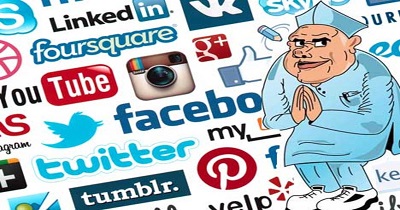Context-
With the rise and deep penetration of social media, a wave of 'mediatisation' has swept over Indian politics, amplifying the media's ability to set political agendas. This transformation has turned elections into image contests between prominent personalities. As media and politics grow increasingly intertwined, media exposure has significantly impacted voting behaviors and public opinions. This evolution underscores the need for strong measures and regulations by the government.
How Does Social Media Benefit Indian Politics?
● Bringing Awareness to the Masses: Historically, the level of public awareness about government policies was much lower compared to the present day. The effective use of social media has significantly increased government outreach, with various campaigns spreading awareness among the populace
● Boosting Democratic Spaces: Influencers with views that challenge the dominant narrative have been quick to catch on, helped by algorithms. A feature of the algorithms used in YouTube and Facebook is that content that is growing quickly in popularity will be boosted to the whole user base. For Example, Dhruv Rathee’s video titled, “Is India becoming a DICTATORSHIP?”, has already garnered 25 million views on YouTube. In a democracy, diversity of opinion and active contestation of political views are critical. The fact that these spaces are being prised open is an indicator of the sites of democratic reclaiming that are emerging in India.
● Improved Analytical System: Compared to traditional methods of gauging public opinion, social media enables time- and cost-effective data collection and analysis with less human effort. Data analytics has become the backbone of election campaigns, helping campaign committees better understand voters and tailor their policies to meet their needs. And so far, for anyone wanting to read the sentiment of the people, the pre-election survey has been replaced by a tweet survey.
● Addressing People's Problems: Social media makes it easy for people to stay up to date on upcoming events, party schedules, and election agendas. Assign a tech-savvy candidate to manage social media and use it to reach out to people and hear their concerns.
Ensuring Free and Fair Elections in a Democratic Society
● Manipulative Content: Democracy requires free and fair elections, where voters should be given all the necessary details to make informed decisions. However, the surge in the circulation of unverifiable information or fake news has been a significant concern during the current elections.
● Centralization within political parties: Traditionally, the party worker and the political intermediary presented voters with political narratives, connecting them with the political ideologies with which they were aligned — generating policy demands from the bottom up. Social media is making the party workers and intermediaries less relevant. This enables greater centralization within political parties, as the leader can directly shape narratives.
● Freedom of Speech and Deception: Freedom of speech does not grant the right to deceive. While freedom of speech supports that political advertising should not be strictly regulated, it is intended to ensure the protection of diversity of opinion and the right to express reasonably. Lies, deception, and treachery are not protected under freedom of speech when they are used to influence voting behavior. Manipulated content is inconsistent with the principles of free speech.
● Political Polarization: Social media campaigns sometimes ignite religious and social tensions across different parts of the country, exacerbating divisions and conflicts. A common criticism of social media is that it creates echo chambers, where users are exposed only to viewpoints they agree with.
● Propaganda Setting: According to the Google Transparency Report, political parties have spent approximately $800 million (Rs 5,900 crore) on election ads over the past two years. Micro-targeting enables dishonest campaigns to disseminate toxic discourse with minimal consequences.
Recommendations for Addressing Social Media's Impact on Politics
● Digital Media Literacy: Initiatives to promote digital media literacy and education are essential. These programs will help the public better understand and critically evaluate the information they encounter online.
● Fact-Checking Partnerships: Collaborations between social media platforms and fact-checking organizations, such as the partnership between Facebook and The Journal. ie to identify fake news, which are crucial in combating misinformation.
● Data Protection Laws: Implementing and enforcing data protection laws that require data processors to obtain consent from data subjects for processing their data is necessary to safeguard personal information.
● Regulation of Political Advertising: The Election Commission of India (ECI) must ensure that political advertising on social media is treated with the same rigor as traditional media, maintaining parity in regulatory standards.
● Strict Enforcement of Conduct Codes: The ECI should strictly enforce the model code of conduct and increase vigilance over the cyber activities of political parties to ensure compliance.
Conclusion
The efforts by the ECI to tackle issues related to digital media reveal that self-regulation by social media platforms is insufficient. The ECI faces challenges in enforcing its authority due to a lack of specific laws addressing new issues like propaganda, fake news, and paid news. Therefore, stronger regulatory measures and specific legislation are needed to effectively manage the influence of digital media on elections. It is high time that to ensure that the voting is not influenced but is done by People’s Own Choices and Preferences and ensure Free and Fair Elections in the country.
|
Probable Questions for UPSC Mains Exam- 1. Discuss the role of social media in shaping political narratives and its impact on democratic processes in India. (10 Marks, 150 Words) 2. Analyze the challenges and solutions related to the regulation of political advertising on social media platforms in India. (15 Marks, 250 Words) |
Source- The Hindu







